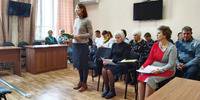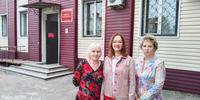The Case of Margarita Moiseyenko and Others in Zeya
Filter
- #
Searches are being conducted in the house of Margarita Moiseenko and her husband Konstantin, as well as in the homes of other believers in the Amur Region.
- #
Searches are being conducted in the homes of 8 Jehovah's Witnesses, including Elena Yatsyk and pensioner Galina Yatsyk. Phones and laptops are seized from believers.
- #
V. S. Obukhov, an investigator of the Investigative Department of the FSB of Russia for the Amur Region, who specializes in religious persecution in several cities of the Amur Region, makes a decision to initiate a criminal case under Part 2 of Article 282.2 of the Criminal Code of the Russian Federation against Margarita Moiseenko, Galina Yatsik and Elena Yatsyk. They are accused of "participation in the activities of a religious association, in respect of which the court made a final decision on liquidation in connection with the implementation of extremist activities."
- #
Investigator Obukhov is prosecuting Margarita Moiseenko, Galina Yatsyk and Elena Yatsyk as defendants under Part 2 of Article 282.2 of the Criminal Code of the Russian Federation.
All women are placed on recognizance not to leave.
- #
The case goes to the Zeysky District Court of the Amur Region.
- #
The judge grants Margarita Moiseenko's petition for the admission of her husband Konstantin as her representative in the trial.
Prosecutor Olga Chursina announces the charge, which states that the defendants committed unlawful acts while participating in worship services. The defense expresses its disagreement with the charges. In her attitude towards him, Margarita Moiseenko says: "I profess the religion of Jehovah's Witnesses, but this is not a crime and has nothing to do with extremism." She continues: "I consider the criminal case to be politically motivated repressions, since the investigating body groundlessly and unreasonably replaced the concept of 'exercising the right of citizens to freedom of religion', which includes the right to read the Bible and discuss it with friends, with the concept of 'carrying out extremist activities.'"
- #
The state prosecutor reads out the written materials of the criminal case, including the results of the photographic portrait examination from the case of Konstantin Moiseenko. The judge asks to read out only those materials that are relevant to the criminal case under consideration, to which the prosecutor objects, explaining that this examination is evidence of the guilt of the defendants.
Further, the results of religious studies and psychological-linguistic examinations are read out.
- #
The prosecutor reads out from the 6th to the 9th volumes of the criminal case, which contain protocols of searches and protocols of inspection of objects seized from other believers from the Amur region. The judge again asks the prosecutor to disclose only what relates to the defendants. The prosecutor cannot find the protocols with the names of the defendants in this case.
- #
Prosecution witnesses are being questioned. Someone uses Article 51 of the Constitution of the Russian Federation, while others point to the falsification of the testimony given by them during the preliminary investigation.
One of the witnesses testifies that she never heard calls for violent actions from the defendants and did not feel any hostility on their part. On the contrary, she speaks of them as kind, peaceful, always ready to help people.
During the hearing, the judge repeatedly states that the defendants are not accused of extremism.
- #
The questioning of prosecution witnesses is ongoing. The defendants testify.
- #
The prosecutor asks to sentence the believers to imprisonment in a penal colony: Margarita Moiseenko - 3 years, Galina Yatsyk and Elena Yatsyk - 2.5 years each.
- #
Margarita Moiseenko's last word in Zeya The last word of the defendant Galina Yatsyk in Zeya The last word of the defendant Elena Yatsyk in Zeya - #
- #
The court decided to cancel the suspended sentence and expunge the convictions of Galina Yatsyk and Elena Yatsyk.
- #
Margarita Moiseyenko is released early from serving her suspended sentence.

